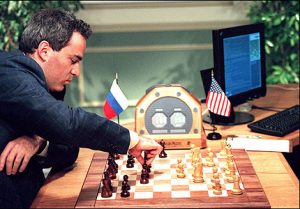A while back, the New York Times ran an interesting interview with Jim McCann, founder and CEO of 1-800Flowers.com. A lot of it was about the mistakes he made along the way, and how he rebounded. His conclusion: "If you look at highly successful people, they make the same number of mistakes as others, but they recover quickly. They don't sit around moaning about what they've done wrong."
As I've written, and teach in my workshops, there is no such thing as pure failure or pure success. Every failure has elements of success in it - at least you tried, and you probably learned something and accomplished something, even if you did fall short of your goal - and every success has elements of failure or compromise. Perfectionists and negative people don't see that: they think that anything that is not a huge success is an awful failure.
And dwelling on your failures is simply a waste of time.
Years ago, I was fortunate to hear one of my heroes, former world chess champion and current Russian democracy activist Garry Kasparov, discuss important lessons he had learned from chess. Here's how he began his talk: “I have won hundreds of chess games, and lost thousands. You have to have the courage to fail.”
The courage to fail. What an amazing phrase – and coming from a hypercompetitive chess champion it takes on a special meaning. Kasparov probably hates failure more than just about anyone – in fact, as his use of the word “courage” implies, he probably fears it - but he had to develop a tolerance for it to reach his goals. That he chose to begin his talk with this point only underscores its importance.
Perfectionists are terrified of failure for all the reasons mentioned earlier, including that they define it too broadly, punish themselves harshly for it, identify too strongly with it so that it represents a kind of ego-death, and are short-sightedly focused on the immediate.
To a compassionately objective person, however, failure is not just inevitable, but essential: meaning, instrinsic to any ambitious path, and probably our most potent route to learning and growth. In other words, if you're not failing at least some of the time, you're probably not pushing yourself enough or taking enough risks. Herman Melville called the willingness to fail, “the true test of greatness.” Samuel Beckett famously said, “Go on failing. Go on. Only next time, try to fail better.” And Winston Churchill, who apart from his statesmanship also wrote and painted prolifically, famously defined success as arising from, “the ability to go from one failure to another with no loss of enthusiasm.”
Needless to say, compassionately objective people also don't overreact to success, for the same reasons (nonidentification with the work, taking the long view) that they don't overreact to failure. They also understand that, pleasurable as success is, it isn't nirvana; and that it introduces its own stresses and complications. (If you sell your book, you have to worry about building your audience – or writing the next one.) Success can also bring a sense of loss, as Joan Bolker eloquently writes in her book Writing Your Dissertation in Fifteen Minutes a Day:
"How do we deal with the fact that there is sadness as well as joy about each major step we take forward – including finishing a doctoral degree? You may expect that you will feel only relief and pleasure when you earn your degree, so you may be startled by feelings of loss and sadness. Maybe you will grieve that a major stage of your life is over, or perhaps you will mourn the important people who are not alive to witness your triumph, or maybe you'll confront the gap between the dissertation you've actually written and the one you imagined you would write...Every major life change destroys the equilibrium of our lives and our self-image and leaves behind a portion of an old self."
I'm guessing that, for many people, a sense of impending loss is a major, and unrecognized, barrier that's keeping them from taking their next step. Compassionately objective people work therefore not just to succeed, but to prepare themselves emotionally and logistically for success - say, by consulting others who are already there, and creating processes and infrastructures before they are needed. Someone who will need to market her novel, for instance, could (and should) create a media plan, and gather the resources needed to complete it, well before the actual publication date.
Compassionately objective people also realize that there is no such thing as a pure failure or success: that most failures contain some element of success (at least, as a learning experience), and most successes, an element of failure or compromise. They also they realize that failure and success are not huge, show-stopping, life-defining events but merely transient states that one moves into and out of throughout one's career.
